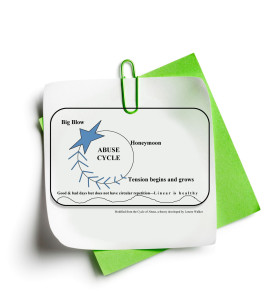
Trapped In an Abusive Relationship?
Last article from the American Counseling Association – Honoring April: Counseling Awareness Month
Relationship abuse is more common than most people realize. The National Domestic Violence Hotline reports that as many as twelve million women and men in the U.S. were the victims of such abuse last year.
Reportedly, about one in four women, and one in seven men, aged eighteen or older, will have suffered severe physical violence by an intimate partner in their lifetime. And psychological aggression by an intimate partner will be experienced by almost half of both men and women during their lives.
Abuse often happens disproportionately higher in rural communities because of isolation and lack of resources.
Why do people stay in relationships where abuse, whether physical or psychological, is taking place? There are numerous reasons. It may be fear of what will happen if the decision is made to leave the relationship. Or it might be that the abused person has been put down so often that their low self-esteem has them believing the abuse is their own fault. For someone who has come from a troubled family, he or she may not be able to recognize the difference between an abusive relationship and a healthy one.
The abuse may simply seem normal. Embarrassment is another reason for not escaping an abusive relationship. The abused person may find it hard to admit that they’ve been abused, may worry that friends and family will judge them, and may even feel that they’ve done something wrong by being involved with an abusive person.
Even for someone who wants to leave, doing so can be difficult. The person may have little or no money of their own. They may have no place to go or know where to find help.
Children may be involved. Fortunately, today, there is a wider recognition of the abuse problem and a number of agencies willing to offer support and shelter.
The National Domestic Violence Hotline (1-800-799-7233) is one place that offers confidential information, support and resources for victims of abuse. They also offer assistance for someone who recognizes that his or her behaviors maybe harmful or unhealthy to a partner.
If you are in an abusive relationship, call the Hotline for advice and help. And if you know of a friend or family member who may be the victim in an abusive relationship, let her or him know that you’re there to listen and be supportive, without being judgmental. Let them know that there are options and encourage them to get help before their situation gets worse.
Counseling Corner” is provided by the American Counseling Association.Comments and questions to ACAcorner@counseling.org or visit the ACA website at www.counseling.org
Until the next time: Live while you live